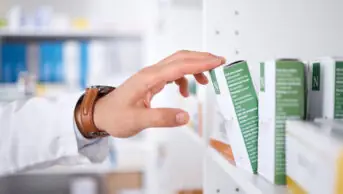
Nic Bunce / The Pharmaceutical Journal
Pharmacy negotiators have suggested that community pharmacists should be able to automatically substitute an alternative medicine if they cannot dispense the prescribed item, as a way to help deal with any possible drugs shortages post-Brexit.
The move to introduce routine therapeutic substitution has already been proposed by Sibby Buckle, vice chair of the Royal Pharmaceutical Society (RPS) English pharmacy board and chair of the RPS pharmacy digital forum.
And now the Pharmaceutical Services Negotiating Committee (PSNC) and local pharmaceutical committees (LPCs) are supporting the proposed change.
The PSNC has suggested a number of ‘secondary measures’ following ongoing discussions with the Department of Health and Social Care over managing the risk to the medicines supply chain after Brexit. These include introducing routine therapeutic substitution, which means a community pharmacist would no longer have to go back to the GP or other prescriber for approval to switch to an alternative product; and more responsive drug tariff pricing, to ensure that pharmacy contractors are properly reimbursed for any additional incurred costs.
The PSNC is concerned that current government plans for wholesalers and drug manufacturers to stockpile supplies for six weeks prior to Brexit are not enough to guarantee that patients will be able to get essential drugs after 29 March 2019 — especially in the event of a ‘no deal’.
Simon Dukes, chief executive of the PSNC, said: “Quite rightly a lot of community pharmacists and LPCs are concerned about Brexit and the impact it will have on patients, communities and of course businesses. I share your concerns. From a medicine supply perspective, an agreed deal is essential if we are to reduce the negative impact of a chaotic exit from the EU.”
Under current legislation, pharmacists can substitute a medicine without going back to the prescriber only in cases where a prescribed generic drug is unavailable and an equivalent branded medicine can be dispensed instead. But they are unable to substitute the other way around — substituting a generic medicine for a branded product — without prescriber approval.
Buckle told The Pharmaceutical Journal: “The present system is time-consuming, inconvenient and unnecessary.
“The status quo only prevails because there is no imperative to change it. Generally things get changed because of patient demand but I suspect not many patients hare written to their MP [about medicine supply issues] because my pharmacist colleagues try and find a solution and protect patients from supply problems.”
She said if there was political will, then the necessary changes to the law could be made “very quickly”.
The proposal for routine therapeutic substitution without the need to return to the prescriber was welcomed by Nick Hunter, chief officer for Nottinghamshire LPC and secretary of Doncaster and Rotherham LPCs.
“The drug supply situation is dire at the moment — without even getting to Brexit,” he said.
The Company Chemists’ Association (CCA), which represents high street pharmacy chains, also accepted that Brexit may trigger the need to review the law around the substitution of medicines.
Malcolm Harrison, chief executive of the CCA, said in a statement: “We recognise that in the light of potential shortages of medicines, provision is needed in the planning to allow pharmacists to take all reasonable steps to supply patients with medicines they need. This may include a review of current legislation to ensure any proposed actions — which could include the substitution of medicines — are made on a solid legal basis.”

